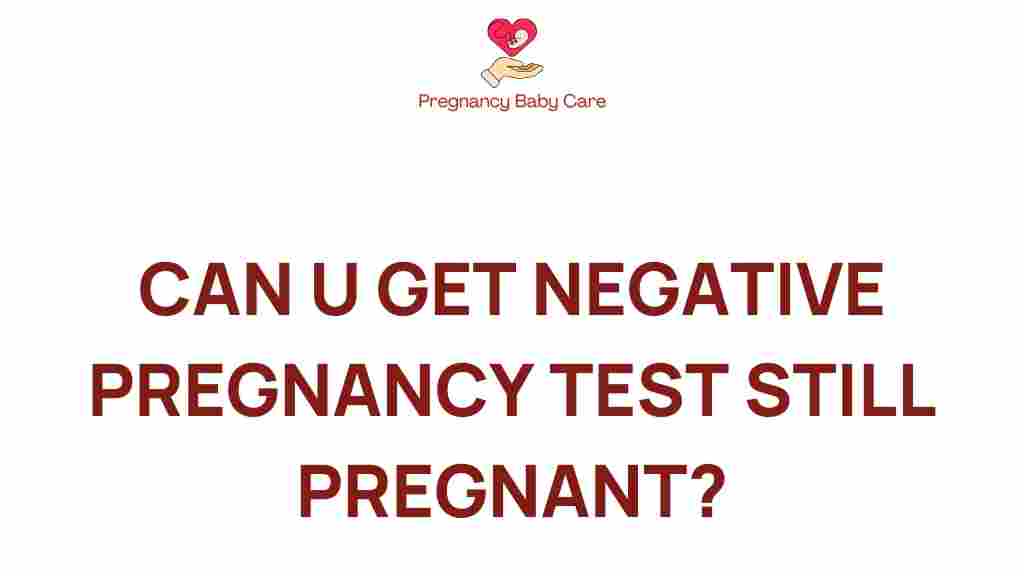Can You Get a Negative Pregnancy Test and Still Be Pregnant?
When trying to conceive or monitoring your menstrual cycle, the anticipation of a positive pregnancy test can be overwhelming. However, many women face the perplexing situation of receiving a negative pregnancy test result despite experiencing clear pregnancy symptoms. This leads to the question: Can you get a negative pregnancy test and still be pregnant? In this article, we will explore the reasons behind false negatives, the role of hCG levels, and how to interpret early pregnancy detection accurately.
Understanding Pregnancy Tests
Pregnancy tests work by detecting the presence of human chorionic gonadotropin (hCG) in your urine or blood. This hormone is produced shortly after a fertilized egg attaches to the uterus. Most home pregnancy tests are designed to detect hCG in urine, and they can be quite accurate if used correctly.
Timing Is Everything
One of the most crucial factors in determining the accuracy of a pregnancy test is timing. If you take a test too early, you may receive a negative pregnancy test result even if you are pregnant. Here are some key points to consider:
- Menstrual Cycle: Understanding your menstrual cycle is essential. If you have irregular cycles, pinpointing ovulation can be challenging.
- Implantation Timing: After fertilization, it takes about 6 to 12 days for the embryo to implant in the uterus and start producing hCG.
- Test Sensitivity: Different brands of home pregnancy tests have varying sensitivities to hCG. Some tests can detect lower levels of the hormone than others.
Why Do False Negatives Occur?
Receiving a negative pregnancy test while experiencing symptoms can be disheartening. Here are some common reasons why false negatives occur:
- Testing Too Early: As mentioned, testing before implantation or shortly thereafter can lead to inaccurate results.
- Low hCG Levels: If your hCG levels are still low, particularly in very early pregnancy, a test may not detect it.
- Improper Testing Technique: Not following the instructions on the test package can lead to errors in results.
- Expired Test: Using an expired home pregnancy test can affect its accuracy.
Common Pregnancy Symptoms to Watch For
Even if you receive a negative pregnancy test, you might still experience various pregnancy symptoms. Here are some common signs to look out for:
- Missed Period: One of the most significant indicators of pregnancy.
- Nausea: Morning sickness is common, especially in the early weeks.
- Breast Changes: Tenderness, swelling, or darkening of the areolas.
- Fatigue: Feeling unusually tired can be a sign of pregnancy.
- Frequent Urination: Increased frequency can indicate hormonal changes.
Step-by-Step Process for Early Pregnancy Detection
If you suspect you might be pregnant despite a negative pregnancy test, follow these steps for accurate early pregnancy detection:
- Wait and Retest: If you receive a negative result, wait a few days and test again, preferably after your period is due.
- Use First Morning Urine: Testing with the first urine of the day increases the chances of detecting hCG.
- Consider Blood Tests: If you continue to get negative results but suspect pregnancy, consult a healthcare professional for a blood test, which can detect lower levels of hCG.
- Monitor Symptoms: Keep track of any persistent symptoms that may indicate pregnancy.
When to Consult a Healthcare Provider
If you’re unsure about your pregnancy status after multiple tests, it’s a good idea to consult a healthcare provider. They can perform a blood test, which is more sensitive than home tests, and provide clarity on your situation.
Troubleshooting Tips for Negative Pregnancy Tests
Here are some troubleshooting tips if you find yourself with a negative pregnancy test but suspect you might be pregnant:
- Check the Expiration Date: Always ensure your test is not expired.
- Follow Instructions: Read and follow the manufacturer’s instructions carefully for accurate results.
- Consider Timing: Make sure you are testing at the right time in your cycle.
- Consult a Doctor: If you have any concerns or symptoms, don’t hesitate to seek professional advice.
Dispelling Pregnancy Myths
There are many pregnancy myths that can lead to confusion. Here are a few common ones:
- Myth: You can’t get pregnant during your period. Fact: While it’s less likely, it is still possible to conceive during your period.
- Myth: All pregnancy tests are equally sensitive. Fact: Different brands have different sensitivities to hCG levels.
- Myth: A negative test means you’re not pregnant. Fact: Early testing can lead to false negatives, especially if done too soon.
Conclusion
In conclusion, receiving a negative pregnancy test result does not always mean that you are not pregnant. Various factors, including the timing of the test and your individual hCG levels, can contribute to false negatives. If you experience persistent pregnancy symptoms despite negative test results, it’s essential to wait a few days and test again or consult a healthcare professional for further evaluation. Remember, early pregnancy detection can be tricky, and understanding your body and menstrual cycle plays a significant role in navigating this process.
For more information on early pregnancy detection and to explore more pregnancy-related topics, visit this resource. Stay informed and take care of your health!
This article is in the category Pregnancy and created by PregnancyBabyCare Team
